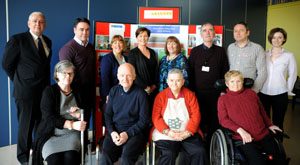 THE Western Trust is supporting Brain Injury Awareness Week (9 – 15 May 2016) and is highlighting the issue of ‘concussion’, more accurately known as “mild traumatic brain injury”.
THE Western Trust is supporting Brain Injury Awareness Week (9 – 15 May 2016) and is highlighting the issue of ‘concussion’, more accurately known as “mild traumatic brain injury”.
Brain injuries are tragically continuing to increase each year across the North.
A mild brain injury often happens in an instant but its effects may have lifetime consequences.
Approximately 3,600 people each year in the Western Trust area will attend hospital with a head injury, but 85% of these will be mild in nature.
The other 15% will be moderate to severe in nature requiring care and support as a result of the brain injury.
The reality being the majority of survivors are young people, aged 16-28 with a normal life expectancy.
The Western Trust has developed an innovative service where a brain injury specialist nurse receives referrals from the hospital emergency departments to help people understand and manage their concussion symptoms to help prevent further complications.
The service has been well received and is meeting a need that previously was not addressed.
The Community Brain Injury Service played a role in a recent project alongside the Headway charity, funded through the social work strategy innovation fund.
This involved a series of information and training sessions for carers, staff and people with physical and sensory disabilities attending the Foyle Disability Resource Centre.
These sessions demonstrated how a brain injury can affect an individual’s behaviour which has seen a reduction in the number of incidents occurring within the facility.
Shane McCarney, Western Trust Consultant Clinical Psychologist and Community Brain Injury Service Lead Clinician said:
“Brain injuries may lead to a number of different problems.
“These include personality changes, cognitive functioning such as memory loss, physical disabilities, speech and language difficulties and sensory loss.
The Western Trust Community Brain Injury team help people with brain injury to recover, rehabilitate and regain their independence.”
Tags:




